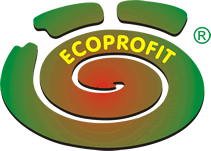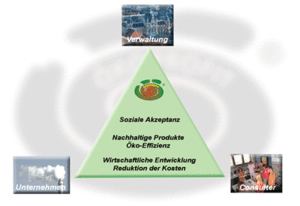Case study: Project ECOPROFIT: Difference between revisions
Hk.novotny (talk | contribs) No edit summary |
Hk.novotny (talk | contribs) No edit summary |
||
| Line 14: | Line 14: | ||
The City of Graz has received a number of international awards for the project ECOPROFIT. The project received the "European Sustainable City Award 1996" and the "Dubai International Award for Best Practices to improve the Living Environment 2002". It was also a finalist in the "Bremen Partnership Award Contest 2001"<ref>http://www.cpc.at/oeko/oe_WasIst_e.htm CPC-Austria - ECOPROFIT® - The idea</ref>. By awarding EU the City of Graz has become the first European Sustainable City<ref>http://www.nszm.cz/cb21/archiv/akce/_nszm/nszm06/sekce06/vsetin/prez_Rakousko.pdf Local Agenda 21 - Sustainable City Graz Austria</ref>. | The City of Graz has received a number of international awards for the project ECOPROFIT. The project received the "European Sustainable City Award 1996" and the "Dubai International Award for Best Practices to improve the Living Environment 2002". It was also a finalist in the "Bremen Partnership Award Contest 2001"<ref>http://www.cpc.at/oeko/oe_WasIst_e.htm CPC-Austria - ECOPROFIT® - The idea</ref>. By awarding EU the City of Graz has become the first European Sustainable City<ref>http://www.nszm.cz/cb21/archiv/akce/_nszm/nszm06/sekce06/vsetin/prez_Rakousko.pdf Local Agenda 21 - Sustainable City Graz Austria</ref>. | ||
The project ECOPROFIT has been successful thanks to its | The project ECOPROFIT has been successful thanks to its unique way to local authorities, businesses and consultants work together through providing common training programs and networking which. This enables an effective flow of information, know-how and considerable synergies. Operational objectives as same as the idea of environmental protection which fits to region are equally major for the future diversification of the local economy and a guarantee for new created jobs. The economic, ecological and social value of ECOPROFIT perfectly complies with the three dimensions of sustainable development. The permanent further development of the project is a central concern of the project team. As a reaction to the wishes of our project participants, special programs were developed for tourism as well as small businesses with less than 10 employees. Project costs are usually financed through public grants and contributions from participating companies. In addition, sponsorship through EU funding programs should be considered<ref> http://www.cpc.at/oeko/oe_WasIst_e.htm </ref>. | ||
[[File:pyramide_2008.gif|thumb|Pyramide of operational objectives,source: http://www.cpc.at/oeko/oe_WasIst.htm, | [[File:pyramide_2008.gif|thumb|Pyramide of operational objectives,source: http://www.cpc.at/oeko/oe_WasIst.htm, | ||
'''legend:''' Unternehmen = Bussines, Verwaltung = Goverment, Soziale Akzeptanz = Social Acceptance, Nachhaltige Produkte = Sustainable Products, Öko-Effizienz = ECO-efficiency, Wirtschaftliche Entwicklung = Economic Development, Reduktion der Kosten = Reduction of costs]] | '''legend:''' Unternehmen = Bussines, Verwaltung = Goverment, Soziale Akzeptanz = Social Acceptance, Nachhaltige Produkte = Sustainable Products, Öko-Effizienz = ECO-efficiency, Wirtschaftliche Entwicklung = Economic Development, Reduktion der Kosten = Reduction of costs]] | ||
Revision as of 10:40, 21 September 2012
CASE STUDY: PROJECT ÖKOPROFIT

"Saving money and helping the environment by combining financial gain and ecological benefit schemes [1]."
The City of Graz, the capital of the federal state of Styria, is the second largest city in Austria and economic heart of the province of Styria[2]. The City of Graz is nowadays increasingly renowned for its exemplary efforts for sustainable development and known as a leader in integrating ideas of sustainability into the city developing plans and policies [3]. In the early 1990s, the region of the City of Graz experienced serious problems caused by air polution; the environmental situation reached a critical stage[4].
In response, the Environmental Department of the City of Graz and the University of Graz cooperated to develop and implement a local environmental management initiative in the City of Graz using integrated environmental technologies to strengthen small and medium-sized enterprises (SMEs) economically and simultaneously improve the local environment[5]. This resulted in 1991 by project ÖKOPROFIT (ÖKOlogistics PROjekt Für Integriete Umwelt-Technik), the ECOPROFIT (ECOlogical PROject For Integrated environmental Technology) which shifts environmental policy from the "end of pipe" stage to the "in process" stage and helps to protect the environment and reduce costs for business by methodological supporting companies of all kinds and sizes to introduce and improve its environmental management schemes[6] [7].
The model ECOPROFIT has been adopted as itself by towns and municipalities all over Austria and abroad or modified to local different circumstances while the main approach remained the same[8]. For the first time it was implemented in Germany as part of the Munich Agenda 21[9][10]. The ECOPROFIT approach is used in Graz, Vienna, Vorarlberg, Klagenfurt in Austria, Munich, Berlin, Hamburg, Dortmund, Aachen, and 60 more cities in Germany, Ljubljana, Maribor in Slovenia, Modena in Italy, Pécs in Hungary, Gurgaon in India, Bucaramanga, Medellín in Colombia, Incheon, Busan in Korea, Panzihua in China as a model of cooperation of the community with regional companies[11].
The City of Graz has received a number of international awards for the project ECOPROFIT. The project received the "European Sustainable City Award 1996" and the "Dubai International Award for Best Practices to improve the Living Environment 2002". It was also a finalist in the "Bremen Partnership Award Contest 2001"[12]. By awarding EU the City of Graz has become the first European Sustainable City[13].
The project ECOPROFIT has been successful thanks to its unique way to local authorities, businesses and consultants work together through providing common training programs and networking which. This enables an effective flow of information, know-how and considerable synergies. Operational objectives as same as the idea of environmental protection which fits to region are equally major for the future diversification of the local economy and a guarantee for new created jobs. The economic, ecological and social value of ECOPROFIT perfectly complies with the three dimensions of sustainable development. The permanent further development of the project is a central concern of the project team. As a reaction to the wishes of our project participants, special programs were developed for tourism as well as small businesses with less than 10 employees. Project costs are usually financed through public grants and contributions from participating companies. In addition, sponsorship through EU funding programs should be considered[14].

Sources
- ↑ http://business.metropoleruhr.de/en/consulting-service/information-for-entrepreneurs/oekoprofit.html Wirtschaftsförderung metropoleruhr GmbH - Information for entrepreneurs - Ökoprofit
- ↑ http://en.wikipedia.org/wiki/Graz#cite_note-grazpraes-1 Graz, Wikipedia, the free encyclopedia
- ↑ A Short History of the City of Graz
- ↑ http://eportfolio.lib.ksu.edu.tw/user/T/0/T093000023/repository/09A0031.pdf The Case of Municipal Policy Enhancing SMEs through an Environmental Approach
- ↑ http://www.cpc.at/oeko/oe_WasIst_e.htm CPC-Austria - ECOPROFIT® - The idea
- ↑ http://eportfolio.lib.ksu.edu.tw/user/T/0/T093000023/repository/09A0031.pdf The Case of Municipal Policy Enhancing SMEs through an Environmental Approach
- ↑ http://business.metropoleruhr.de/en/consulting-service/information-for-entrepreneurs/oekoprofit.html Wirtschaftsförderung metropoleruhr GmbH - Information for entrepreneurs - Ökoprofit
- ↑ http://www.nszm.cz/cb21/archiv/akce/_nszm/nszm06/sekce06/vsetin/prez_Rakousko.pdf Local Agenda 21 - Sustainable City Graz Austria
- ↑ http://business.metropoleruhr.de/en/consulting-service/information-for-entrepreneurs/oekoprofit.html Wirtschaftsförderung metropoleruhr GmbH - Information for entrepreneurs - Ökoprofit
- ↑ http://www.stenum.at/en/?id=produkte/oeko/oeko-intro STENUM GmbH. - EcoProfit® Ecological Project for Integrated Environmental Protection
- ↑ http://ec.europa.eu/environment/sme/pdf/okoprofit_en.pdf
- ↑ http://www.cpc.at/oeko/oe_WasIst_e.htm CPC-Austria - ECOPROFIT® - The idea
- ↑ http://www.nszm.cz/cb21/archiv/akce/_nszm/nszm06/sekce06/vsetin/prez_Rakousko.pdf Local Agenda 21 - Sustainable City Graz Austria
- ↑ http://www.cpc.at/oeko/oe_WasIst_e.htm